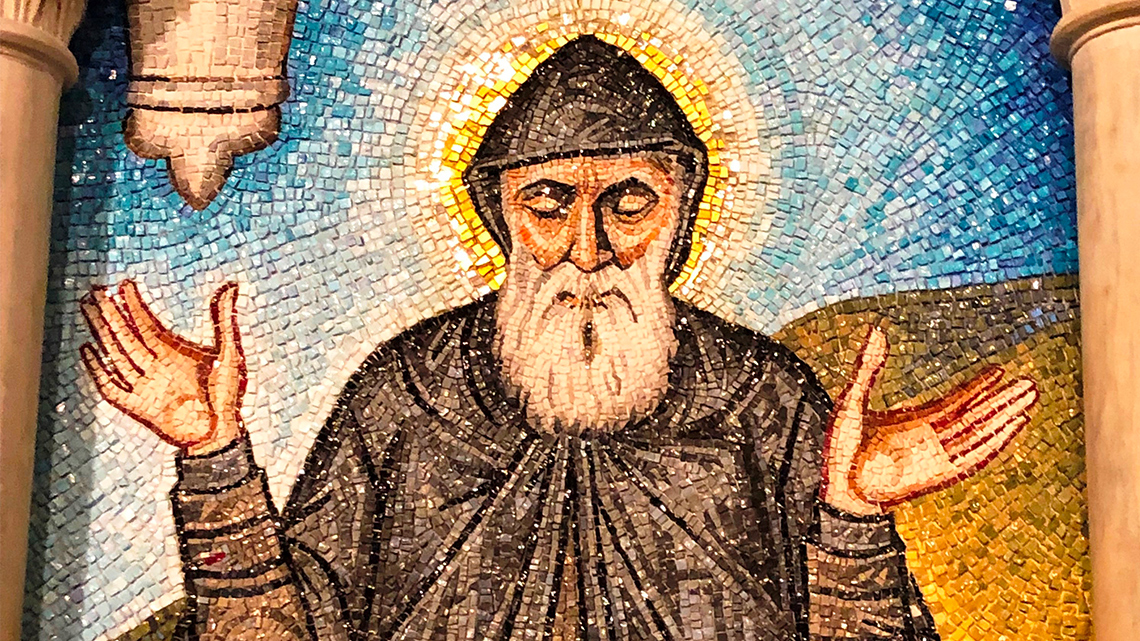Saint Charbel was a Maronite Catholic priest, monk, and hermit who lived in 19th Century Lebanon and was beatified by Pope Paul VI in 1965.

A Lebonese Maronite, St Charbel is known for both his holiness and his ability to unite Christians, Muslims and Druze.
Youssef Makhlouf was born in the year 1828 in the mountainous village of Bekaa’kafra – said to be the highest village in Lebanon. It was an arena of conflict between the Ottomans and the Egyptian army at the time. The resources of the land were pillaged, homes were confiscated and villagers taken way for forced labour. At a very young age, Youssef himself experienced the loss of his father who died while returning from Corvée in the Turkish forces – an unpaid, forced labour.
At the age of 23, Youssef joined the Lebanese Maronite Order, entering first the monastery of Our Lady of Mayfouq, followed by the monastery of Saint Maroun, Annaya. He took the name Charbel, and after professing his vows, he continued his studies in the monastery of Kfifan. He was ordained a priest in 1859.
A year later, while Father Charbel was a monk in the monastery of Saint Maroun, Annaya, Mount Lebanon was experiencing deadly civil war. This affair led to the martyrdom of forty monks from the Lebanese Maronite Order. Despite the death of his brother monks, Father Charbel remained persistent in his prayers, in his devotion to his vows and in his spiritual growth. This led him to enter the hermitage in the year 1875.
In the last quarter of the nineteenth century, while Father Charbel was living in the hermitage, Mount Lebanon experienced the worst crisis in the 19th century. Unable to compete with Chinese silk which flooded the European market at the time, the Lebanese economy was hit with what was known as the ‘Silk Crisis’, forcing thousands of families to emigrate to Americas. Among those who emigrated to Mexico were Saint Charbel’s brothers. Yet again, the hermit Father Charbel was faced with the pain of losing his family and loved ones.
On 16 December 1898, while celebrating Holy Mass, Father Charbel was struck with hemiplegia. He spent the next eight days in excruciating pain. His only weapon was prayer, and he persisted in his prayers until he died on the night of Christmas Eve of that same year.
Saint Charbel was buried in the monastery’s burial grounds, but there were few who attended his burial due to the absence of the monks who had gone to the funeral of the Maronite Patriarch Youhanna Al-Hajj.
By Fr Fadi Kmeid OLM
Today, we are encountering times of great change in our societies, and even more so from a religious aspect. Today, and for many, it is difficult to find God. Societies no longer depend on the will of Our Father, but on fate and destiny. The world is not as we knew it, and once more we find ourselves longing for that glorious time that was the time of the Saints. We fall victim to that state of yearning and nostalgia whenever our memories recall decisions of the past which, though may not have been without their flaws, still leave us with the marks of great and joyful experiences.
The current changes in our society have fittingly driven me to find out more about that time, especially the historical, social, and political conditions in which Saint Charbel lived and was sanctified, so that maybe we can benefit from the past in order to understand the present.
Saint Charbel is one of those brilliant pages in the history of our Maronite faith, church and our homeland, Lebanon. He lived seventy years of ongoing problems and struggles on this earth and was an example of commitment and stability in God. He never once went astray from his monastic vows. He did not lose his hope in God the Father, the Son, and the Holy Spirit, and thus he reached in his lifetime the height of Christian life and unity with God.
Charbel’s message to us, today, is not only a message of trust in a God who defeated sin, the devil and death, but also a message of holiness, and of hope in our Lord God Jesus Christ who says: “Come to me, all who labor and are heavy laden, and I will give you rest” (Mt. 11:28).
No matter how much time has passed and regardless of how much it has changed, the time of the Saints is here, today, just as it was yesterday.